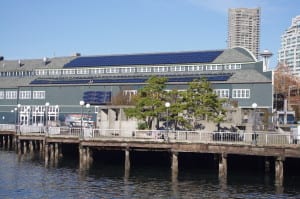 This Friday, 250 business students at the University of Washington will present their ideas on how Seattle City Light could best incorporate solar electricity generation by residents and/or the utility into its operations.
This Friday, 250 business students at the University of Washington will present their ideas on how Seattle City Light could best incorporate solar electricity generation by residents and/or the utility into its operations.
This Friday, 250 business students at the University of Washington will present their ideas on how Seattle City Light could best incorporate solar electricity generation by residents and/or the utility into its operations.
The case study competition is a capstone project for seniors. Teams of five students each will present their business cases to panels of judges from City Light.
“Seattle City Light is pleased to partner with the Foster School of Business to examine one of the most complex and important issues the utility faces in the medium to long-term,” General Manager and CEO Jorge Carrasco said. “It’s also an issue that confronts the industry as a whole. We’re looking forward to the fresh ideas and perspectives that the students will bring to the table.”
Collaborating on the case study competition benefits City Light and UW. The utility receives fresh perspectives on an important strategic decision and UW students get to apply their learning to a timely issue.
“Our partnerships with organizations in the case competition are important for the Foster School of Business and its mission of preparing exceptional business leaders,” said Josina Garnham, experiential learning manager for the Foster School of Business at UW. “It is our hope the organizations we work with gain excellent, focused ideas and exposure to talented future employees and customers.”
Utilities across the country are searching for ways to incorporate solar generation into their operations in a strategic manner.
As a publicly owned utility, Seattle City Light operates as a non-profit organization that must balance environmental, financial and social considerations in its decisions.
Residents and business owners who install solar panels are able to generate clean, renewable energy and reduce the amount of electricity they buy from City Light. Those are important community, economic and environmental benefits.
City Light is still responsible for providing access to full capacity electricity service for each of those customers. Supporting those fixed costs of operation while revenue from electricity sales declines is a challenge for all utilities.
In the competition, the students will propose what City Light’s strategic position(s) should be regarding solar energy, including whether the utility should actively promote and develop its use, what specific offerings the utility should provide, and whether the Community Solar program is viable along with how to structure, market and price it. The case studies will consider short-term and long-term strategies to satisfy key stakeholders, encourage supporters and overcome detractors.
Students use team skills, research, analysis and problem-solving skills in preparing their case studies and practice their professional presentations. The competition synthesizes classroom learning and provides a valuable, relevant experience before the students launch into their careers in just a few short months.
One member of a winning team from UW’s 2013 competition said, “The most valuable learning experience from the Foster Case Competition is the real life business application of our cumulative education here in the business school.”
